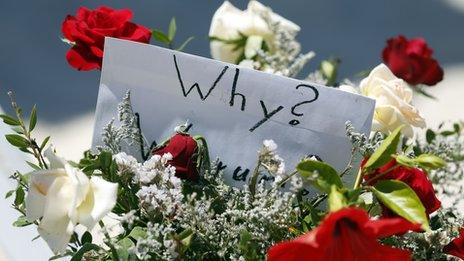Tunisia attack: Cameron says IS fight 'struggle of our generation'
- Published
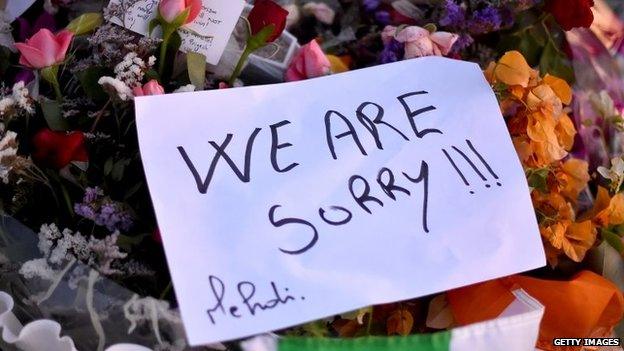
Holidaymakers have been continuing to leave tributes at the scene
The fight against Islamic State is "the struggle of our generation", David Cameron has said, as it emerged the British death toll in the Tunisian attack will rise above 30.
Home Secretary Theresa May has laid flowers at the scene of the attack.
A total of 38 people were killed on a beach near Sousse by a gunman with links to Islamic State extremists.
All Britons injured in the attack will be returned to the UK within 24 hours, Downing Street said.
Full coverage of the Sousse attack
An RAF C17 transport plane left Brize Norton in Oxfordshire on Monday at lunchtime bound for Tunisia to help evacuate casualties.
The prime minister said that if families wished, aircraft could help return their loved ones' bodies to the UK.
He told BBC Radio 4's Today programme the "absolutely horrific" events had "shocked the whole of the world".
He said IS posed "an existential threat" to the West, and its members in Iraq and Syria were plotting "terrible attacks" on British soil.
Mr Cameron - who chaired another meeting of the Cobra emergency committee on Monday morning - said the UK must have a "full-spectrum response" to the IS threat - including continuing with air strikes.
Asked if British troops were needed on the ground, he added: "Our strategy is to build up local armies. It's much easier to just invade a country... it's easier and faster, but that has consequences."

Tunisia beach attack: The victims
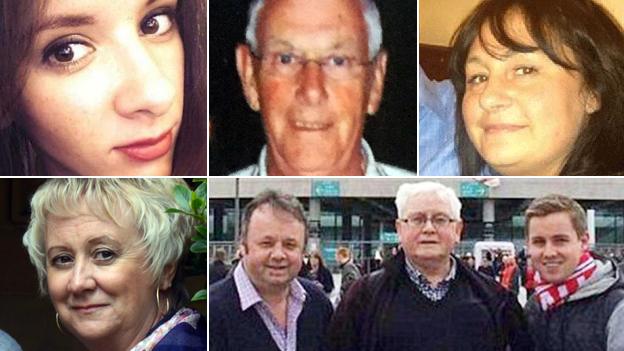
The names of those killed in the attack are slowly emerging. Here's what we know so far about those who lost their lives, as well as those who are injured and missing.

Tributes are continuing to be paid to the British victims, who include three generations of the same family, university graduates and a husband who died trying to shield his wife.
A number of British tourists remain missing, with their relatives continuing to face an agonising wait for news.

Analysis: Dominic Casciani, home affairs correspondent
The investigation into the Tunisia beach attack has become one of the largest counter-terrorism operations the UK has seen in a decade.
More than 600 officers and staff have been assigned to the operation because of the scale of the attack and its international nature.
In the UK, some 380 officers and staff have been meeting British tourists at airports to gather evidence. On Saturday alone, the police met passengers returning on 27 flights.
Detectives will want copies of any pictures or video from their cameras and phones that will not just record the attack but, potentially, other scenes that may help establish the lead-up to Seifeddine Rezgui opening fire.
Detectives want to build as complete a picture as possible of what happened and they are appealing to anyone who was in Sousse around the time of the attack to get in touch.

The BBC understands the number of British victims - which currently stands at 18 - will rise to at least 30 once the formal identification process is complete.
Most of the dead have not been officially identified, with most details so far coming from friends and family. Suffolk Police, however, have confirmed that 52-year-old Stuart Cullen, from Lowestoft, was among those who died.
Home Secretary Theresa May: ''We are very clear that the terrorists will not win''
Three Irish people were also killed, along with one Belgian and one German, and Tunisians are also thought to be among the dead. At least 36 people were injured.
It is also understood the process is taking time because of strict Tunisian regulations, including the local coroner's requirement for medical or dental records.
The UK government also suggested officials were having difficulty identifying victims as many were not carrying identification and because the injured were being moved between hospitals.
'Radical narrative'
Mr Cameron said UK air strikes against IS in Iraq were having an effect even if they made Britain a target.
David Cameron on the terror threat: ''It is a battle you have to fight on every front''
"I think that frankly, we are a target. They have declared war on us, they are attacking our people at home and overseas whether we like it or not... They are attacking our way of life and what we stand for.
"There are people in Iraq and Syria who are plotting to carry out terrible acts in Britain and elsewhere and as long as ISIL exists in those two countries we are at threat."
The PM likened the fight against IS to that against communism: "It's a battle of our values and our narrative against their values and their narrative. We have to get that right as well as the military end of things."
He said it wasn't enough to "destroy [IS] at source", adding: "We have to deal with this appalling radical narrative that's taking over the minds of young people in our country."
The UK has a team of more than 50 consular staff, police officers and experts from the Red Cross on the ground in Sousse.
Detectives from the Met Police are among officers there helping with the investigation into the deadliest single terrorist attack on British people since 52 were killed in the London bombings of 2005.
Attacker 'had help'
Some 3,500 British tourists have flown home from Tunisia since Friday's attack.
Salman Sayed, Thomas Cook's UK managing director, said anyone booked to travel there up until 12 July could cancel if they wished, and anyone due to travel before 31 October could amend their trip, including changing to another country.
Tourists Rick Harber and Daisy Lambert say they feel loyalty to the Tunisian people: ''It's not their fault''
Some holidaymakers have criticised tour operators' response to the attack, but Mr Sayed told the BBC the company was doing its best in an "extraordinary" situation.
"We brought in additional staff immediately from Turkey and deployed them in our resorts. We have also deployed the maximum number of people we could over the weekend in our contact centres in the UK," he said.
Gillian Edwards from the Association of British Travel Agents: ''This was a highly unusual situation''
Gunman Seifeddine Rezgui shot at people on the beach near the Imperial Marhaba and Bellevue hotels. He then entered one of the hotel lobbies, where explosives were also detonated.
The Tunisian authorities have said they believe the 23-year-old had help in carrying out the attack.
They believe the suspected accomplices provided the Kalashnikov assault rifle to Rezgui and helped him get to the scene, interior ministry spokesman Mohamed Ali Aroui told AP.
He said the attacker's father and three friends he lived with in Kairouan, where he studied, had been detained for questioning.
Holiday firms put on extra flights over the weekend for people wanting to return home. Flights to the country have also been cancelled.
Meanwhile, the Foreign Office has updated its travel advice, external to warn that further terrorist attacks in Tunisia are possible, and urged people to be vigilant.
The Tunisian government has brought in increased security measures, and the country's UK ambassador told the BBC armed police would be deployed to protect tourist beaches.
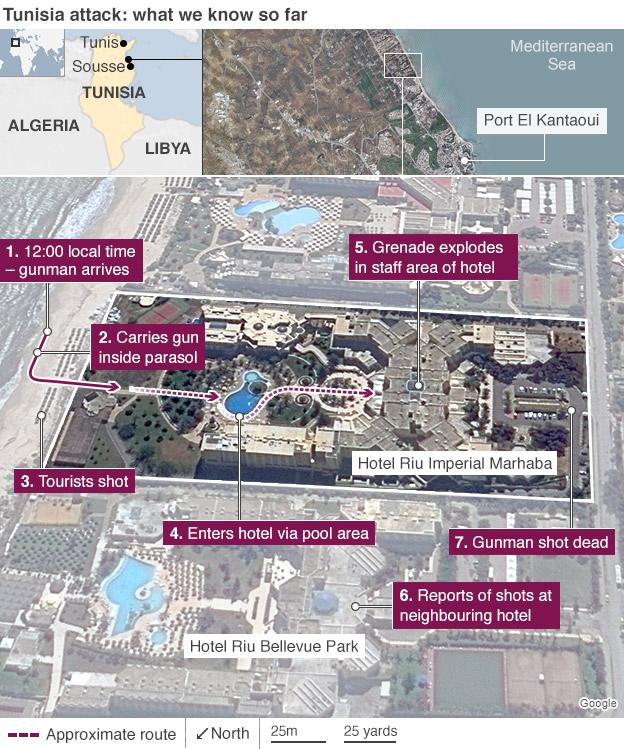
- Published29 June 2015
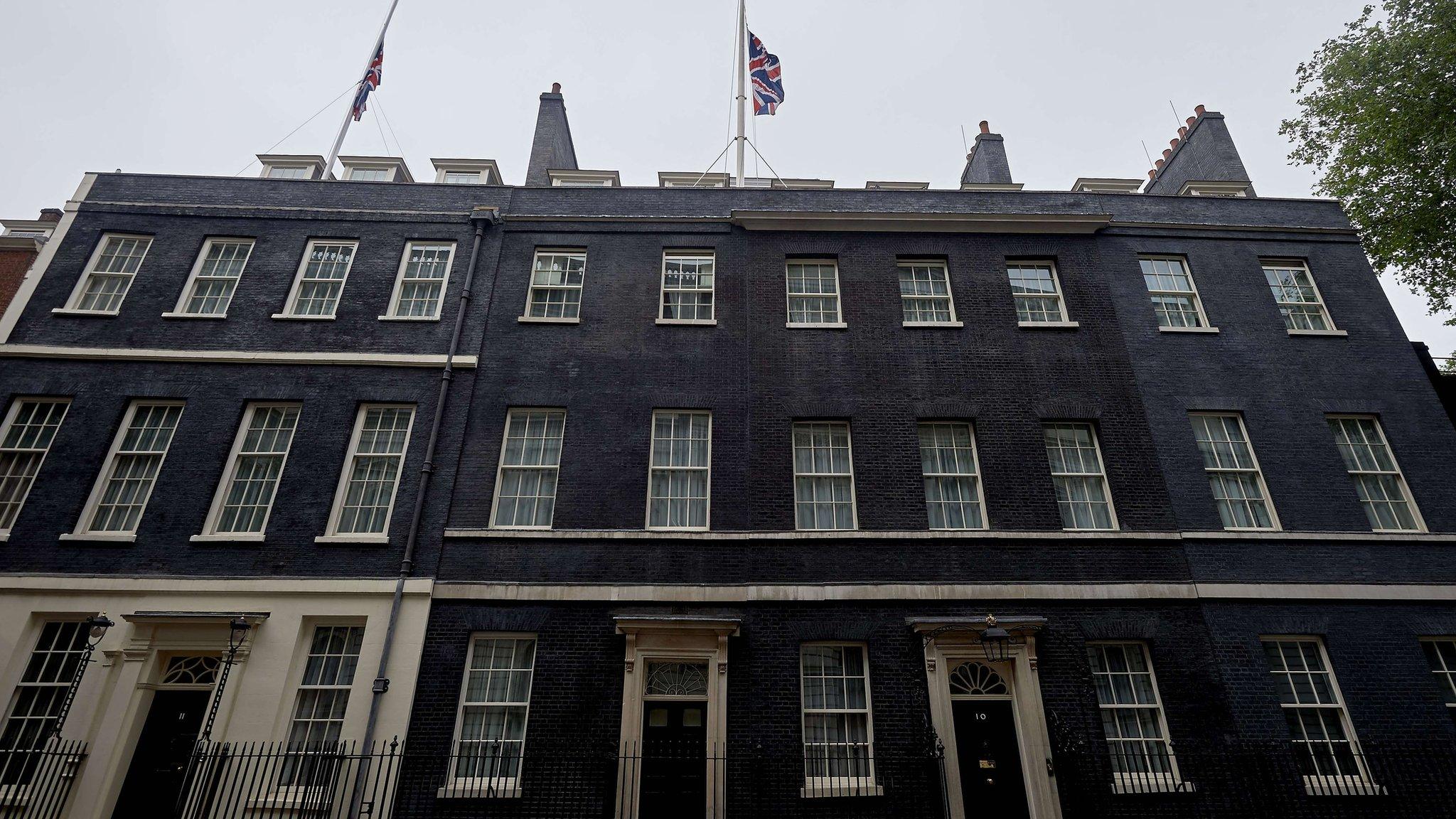
- Published28 June 2015
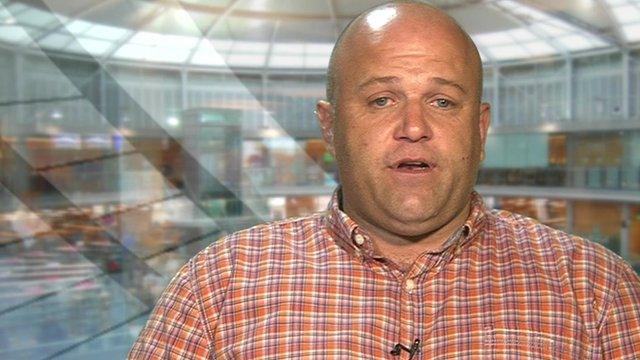
- Published28 June 2015
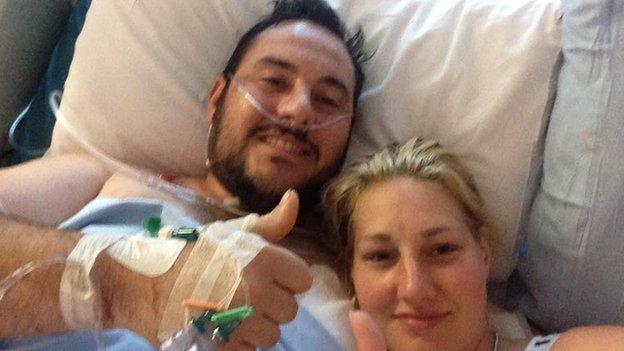
- Published29 February 2016
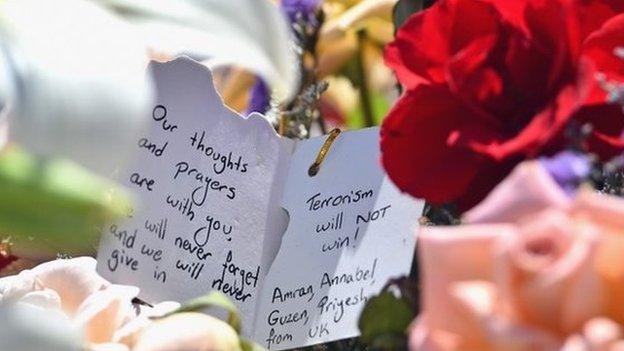
- Published27 June 2015
